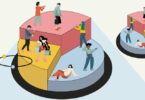Quiz questions on Total Quality Management:
Which of the following is the definition of quality?
(a) Fitness for Purpose
(b) Zero Defects
(c) Right First Time
(d) All of these (and more!)
Which of the following is not one of the major categories of costs associated with quality?
(a) prevention costs
(b) appraisal costs
(c) internal failures
(d) none of the above, they are all major categories of costs associated with quality
An opportunity flow diagram as part of a Six-Sigma quality improvement process might be found in which DMAIC category?
(a) Define
(b) Measure
(c) Analyze
(d) Improve
Which of the following refers to the upper limit on the percentage of defects that a customer is willing to accept?
(a) Acceptable Quality Level (AQL)
(b) Lot Tolerance Percent Defective (LTPD)
(c) Average Outgoing Quality (AOQ)
(d) Average Outgoing Quality Limit (AOQL)
“Quality is defined by the customer” is
(a) an unrealistic definition of quality
(b) a user-based definition of quality
(c) a manufacturing-based definition of quality
(d) a product-based definition of quality
(e) the definition proposed by the American Society for Quality Control
An analytical tool used in the Six-Sigma quality improvement program is which of the following?
(a) Continuous improvement
(b) Quick response
(c) Partnership diagrams
(d) Check sheets
Related: human resource management quiz
The philosophical leaders of the quality movement, Philip Crosby, W. Edwards Deming, and Joseph M. Juran, had the same general message about what it took to achieve outstanding quality. Which of the following was not part of that message?
(a) Quality is free
(b) Leadership from senior management
(c) Customer focus
(d) Total involvement of the workforce
Which of the following is NOT true about TQM?
(a) Focused on worker’s activity rather than management
(b) Meeting the needs and expectations of customers
(c) Inclusion of every person in the organization
(d) Covering all the functional areas of the organization
Which of the following is related to lean production?
(a) Philosophy of waste elimination
(b) Lean consumption
(c) Never running out of inventory
(d) The Wahei-Subaru method
The so-called ‘Quality Gurus’ of total quality management (TQM) do NOT include one of the following:
(a) W Edwards Deming
(b) Joseph M Juran
(c) Kaoru Ishikawa
(d) Bill Cosby
From the following which one is not included in quality cost.
(a) internal failure cost
(b) appraisal cost
(c) prevention cost
(d) implicit cost
Related: database quiz
A Pareto chart as part of a Six-Sigma quality improvement process might be found in which DMAIC category?
(a) Define
(b) Measure
(c) Analyze
(d) Improve
TQM is being criticized on the basis of factors which are:
(a) Weak implementation of TQM practices or strong management perspective
(b) Strong implementation of TQM practices or weak management perspective
(c) Weak implementation of TQM practices or weak management perspective
(d) Strong implementation of TQM practices or strong management perspective
According to the manufacturing-based definition of quality,
(a) quality is the degree of excellence at an acceptable price and the control of variability at an acceptable cost
(b) quality depends on how well the product fits patterns of consumer preferences
(c) even though quality cannot be defined, you know what it is
(d) quality is the degree to which a specific product conforms to standards
A flowchart as part of a Six-Sigma quality improvement process might be found in which DMAIC category?
(a) Define
(b) Measure
(c) Analyze
(d) Improve
Quality control charts do not need to be investigated when:
(a) Two consecutive points are near the control limit
(b) Suspiciously ‘average’ behavior occurs
(c) An apparent trend occurs in one direction
(d) Four consecutive points appear on one side of the center line
Related: Interpersonal communication practice test
Which of the following refers to the quantity expected to be received by the beginning of the period in which it is shown?
(a) Gross requirements
(b) Net requirements
(c) Planned-order receipts
(d) Planned-order releases
Broadly quality does not include
(a) fitness for use
(b) grade
(c) degree of excellence
(d) price
Which of the following is an analytical tool used in Six-Sigma quality improvement programs?
(a) Leadership
(b) Pareto charts
(c) Management by fact
(d) Continuous improvement
A fishbone diagram as part of a Six-Sigma quality improvement process might be found in which DMAIC category?
(a) Define
(b) Measure
(c) Analyze
(d) Improve
In the textbook, Toyota’s Fujio Cho identified which of the following types of waste should be eliminated?
(a) Excess quality
(b) Overproduction
(c) Underproduction
(d) Environmental
Related: budgeting questions and answers
Which of the following is not evidence of service as experienced by the customer?
(a) People
(b) Process
(c) Procedure
(d) Physical Evidence
All of the following costs are likely to decrease as a result of better quality except
(a) customer dissatisfaction costs
(b) inspection costs
(c) scrap costs
(d) maintenance costs
Quality planning does not include
(a) Identify the customers
(b) determine their needs
(c) determine levels of management
(d) optimize the product features to meet our and customer needs.
Kaizen means ___ ?
(a) Radical innovation
(b) Step change innovation
(c) Open innovation
(d) Continuous improvement
When a firm’s service quality specification does not match customer expectations, the gap between the two is known as
(a) Standard gap
(b) Service performance gap
(c) Communication gap
(d) Market information gap
Which of the following is not a reason which may prevent the successful adoption of a continuous improvement program?
(a) Lack of trust in employees in management motive
(b) No clear purpose for the program
(c) Incentives scheme linked to the program
(d) Resistance to change
Related: financial trivia questions and answers
The major business functions consisting of research and development, product design, manufacturing, marketing, distribution, and customer service refer to:
(a) The transformation processes
(b) Value chain
(c) Life cycle
(d) Quality control
The philosophical leaders of the quality movement, Philip Crosby, W. Edwards Deming, and Joseph M. Juran, had the same general message about what it took to achieve outstanding quality. Which of the following was part of that message?
(a) Fourteen steps for quality management
(b) Quality is free
(c) Customer focus
(d) Zero defects
Which of the following is not a factor that will influence customer satisfaction or dissatisfaction during the service encounter?
(a) Spontaneity
(b) Image
(c) Empathy
(d) Recovery
Public responsibility is a __ in TQM.
(a) technique
(b) process
(c) method
(d) principle
The technical aspect of Six Sigma includes all of the following aspects:
(a) Improving process performance
(b) Use of statistical methods
(c) Top management commitment
(d) Reduction in variations
Related: insurance quiz questions and answers
The highest level of customer expectation is
(a) Ideal Expectation
(b) Normative Expectation
(c) Acceptable Expectation
(d) None of the above
In order to build quality in the culture, a __ is established to provide overall direction. It is the driver for the TQM engine.
(a) quality council
(b) quality method
(c) quality system
(d) quality circles
_____ is a philosophy of continually seeking ways to improve operations.
(a) Poke – yoke
(b) Kaizen
(c) Robustness
(d) Quality deployment
The 5 pillars of TQM includes product, process, system, people and __
(a) communication
(b) Motivation
(c) leadership
(d) resource






